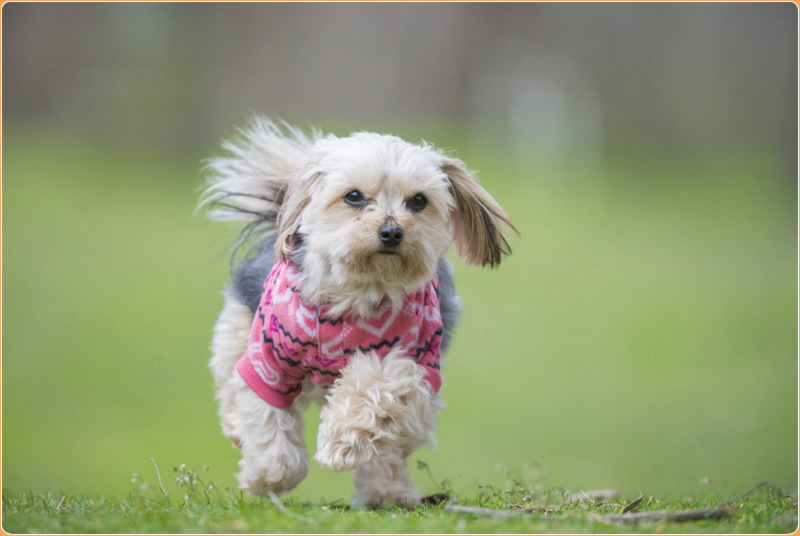Morkie Dog Breed Information
The Morkie, a new breed of small mixed-breed dog, comes from crossing a Maltese with a Yorkshire Terrier. Known for its small size and fluffy coat that often mats, it shows characteristics of both its Maltese and Yorkshire Terrier parents that fall within the breed standard. This little dog typically tips the scales at 4 to 8 pounds and has skin that comes in various colors, so it’ll need regular grooming.
Morkies are known for being very loving and forming strong connections with their owners, including older children, making them great pets for families and retirees. These new breed dogs, Morkies, have a lot of energy and require daily exercise to maintain Morkie dog breed health.
Anyone considering getting a new dog, especially a Morkie, should be ready to meet their specific health, diet, and care requirements for a fulfilling relationship.
Key Takeaways
- Morkies weigh between 4 to 8 pounds and need regular grooming.
- These affectionate dogs bond well with owners, ideal for singles and seniors.
- A Morkie’s health and happiness demand consistent exercise and proper care.
Quick Facts
Morkies are a charming mix of Maltese and Yorkshire Terrier breeds, typically weighing around 4-8 pounds and standing about 7-9 inches tall. These small dogs, Morkies, belong to what is often called a new breed. They may struggle when left alone or introduced to larger dogs due to their small size—designer breeds due to their intentional mixed breeding from purebred parents.
They inherit social personalities and a luxurious, silky coat from their Maltese and Yorkshire Terrier ancestors, which means they need regular grooming. While Morkies are known for their loving nature, the American Kennel Club does not officially recognize them.
They generally live for 12-15 years but can inherit health issues like dental problems, patellar luxation, and eye conditions from their parent breeds.
Morkie Dog Breed Pictures






Overview
Morkies, a charming mix of Maltese and Yorkshire Terrier, are perfect for those living in apartments because of their small size and low-shedding coats. They weigh 4-8 pounds, making them easy to manage in compact spaces. However, they can be pretty vocal, so potential owners should be prepared for some barking.
These little dogs are friendly and enjoy being around people, but they benefit from early socialization and regular training to prevent any stubborn behavior they might inherit from their parents. They need a reasonable amount of exercise—about 30 minutes daily—to stay happy and healthy.
Key Morkie Features
The Morkie is a charming mix of its Maltese and Yorkshire Terrier parents, sporting a small size and a playful and loving personality. They carry the Yorkie’s zest and the Maltese’s tender nature, making them adaptable to various living environments and an excellent choice for many families.
| Feature | Description | Impact on Care |
|---|---|---|
| Size | 4-8 lbs | It helps prevent tangles; consistent grooming is important |
| Personality | Loving, playful, can be stubborn | Needs patient training; tends to form deep bonds |
| Coat | Daily brushing needed | It helps prevent tangles; constant grooming is important |
| Lifespan | 11-15 years | A commitment to their health and happiness is needed |
This chart outlines the primary qualities you should consider if you’re considering a Morkie as a new addition to your home.
History of the Morkie

Understanding the Morkie breed requires a look at its unique heritage, which blends two popular dogs: the Maltese and the Yorkshire Terrier. These parent breeds come from different countries and have distinct histories shaping Morkie’s traits.
The Maltese dates back to ancient times, while the Yorkshire Terrier has its roots in 19th-century England. This mix was initially accidental, but breeders saw the appeal in these small, personable dogs over time and began to breed them purposefully.
Social trends and people’s love for small, low-shedding dogs have made the Morkie a sought-after companion.
Hybrid Parentage History
The Morkie, a charming mix between Maltese and Yorkshire Terriers, started turning heads in the late ’90s. These parent breeds were loved for specific qualities: the Maltese’s affectionate, vibrant personality and the Yorkie’s bold, spirited nature.
Combining these traits, breeders aimed to create the perfect companion for those wanting a petite, minimal-shedding dog. The result was the Morkie, a friendly and easy-to-handle breed that met the growing interest in unique and tailored dog varieties.
Originating Countries
Morkies, a charming crossbreed, have their roots in North America, where breeders began mixing Maltese and Yorkshire terriers in the late 20th century. These dogs became famous for their low-shedding coats and appealing looks.
The Maltese breed, one of the oldest, dates back to before Greek civilization and was a favorite among the Roman nobility. It originates from Malta, bringing its flowing white coat and friendly nature to the Morkie.
The Yorkshire terrier, which emerged in 19th-century England, was a hit among those looking for a trendy pet, recognized by its striking blue and tan fur.
Combining these two beloved toy breeds has given the Morkie the cherished traits of both ancestors.
Morkie Mixed Breed Development Timeline
In the late 1990s, North American breeders began mixing Maltese and Yorkshire Terriers, creating the Morkie breed. These dogs are loved for their small size, friendly personalities, and low-shedding coats.
As a recent addition to mixed breeds, Morkies have quickly become favorites for people who live in apartments and enjoy having a small dog to cuddle with. They are more likely to have a balanced temperament when they meet various people and animals early in life.
While the American Kennel Club doesn’t recognize Morkies, these dogs have a dedicated following and can be registered with specialized designer dog clubs. Their growing popularity shows how well they’ve inherited the best qualities of their Maltese and Yorkshire Terrier ancestors.
Physical Dimensions

If you’re considering getting a Morkie, knowing their size and growth expectations is beneficial. A typical adult Morkie stands about 6 to 8 inches tall at the shoulder. They usually weigh between 4 and 8 pounds, making them a small-sized dog breed.
Morkies can vary in size; these differences are often due to their mixed-breed heritage. As they grow from puppies to adults, they follow a growth pattern that usually stabilizes around one year of age. Understanding these details helps in preparing a suitable living space and knowing how to care for them properly.
Average Morkie Height
On average, a Morkie stands between 7 to 9 inches tall. This small size makes the Morkie a perfect pet for those living in apartments or homes with limited space. Morkies are part of the toy dog group as a mix of Maltese and Yorkshire Terriers.
However, their small jaws often lead to dental problems due to crowded teeth. Choosing a responsible breeder and giving your Morkie regular dental care is vital to prevent these health issues. Being small and adaptable to city living means Morkies must commit to their health needs.
Breed Weight Range
Morkies typically weigh between 4 and 8 pounds, making them one of the smaller toy breeds. Their petite size makes them a favorite among city dwellers with limited living space, like apartment residents. These dogs remain small in stature for their entire lives, with their weight being a vital feature of the breed.
Even when fully grown, a Morkie rarely extends beyond 8 pounds, retaining its status as a toy breed. Despite inheriting one of many genetic combinations from their Maltese and Yorkshire Terrier parents, Morkies consistently display these tiny dimensions. This predictability in size makes them an excellent choice for those who prefer petite dogs.
Size Variations
Morkies are small dogs typically standing about seven to nine inches tall at the shoulder. They usually fall within a specific size range due to careful breeding practices to preserve the breed’s standard physical traits. However, individual Morkies might vary slightly in size because of their genetic background and their particular line.
When looking at a Morkie’s size, it’s vital to consider both height and weight to gauge the pet’s health and suitability within the expected scope for the breed.
Growth Patterns
Morkie puppies increase during their first few months, with most reaching their full size between 6 and 8 months. Their growth rate may vary due to the health traits they inherit from their Maltese and Yorkshire Terrier parents.
It’s essential to keep an eye on their weight to avoid obesity, which can be a problem for small dogs. Their silky coats need regular brushing to stay smooth and prevent discomfort from tangles.
A well-rounded diet and consistent vet visits help maintain their health and address potential issues early.
Ideal Proportions
Morkies, a charming blend of Maltese and Yorkshire Terrier, typically weigh between 4 and 8 pounds and stand 7 to 9 inches tall at the shoulder. This size places them in the small dog category, which means they need extra attention to stay healthy.
Their long, silky coats are beautiful but require consistent grooming to prevent tangles and keep their fur shiny. Regular brushing and a monthly visit to the groomer can keep their coats in tip-top shape.
Morkies’ small frames also make them more likely to experience health issues like a collapsed trachea; keeping them at an optimal weight helps reduce such risks.
Temperament Traits

Understanding the Morkie’s temperament is vital for anyone considering bringing this lively dog into their home.
Morkies are full of energy and playfulness, so they need plenty of activities to entertain them.
They tend to form a deep attachment to their families, often choosing a favorite person to stick close to.
To ensure they get along well with other animals and people, introducing them to various experiences early on is essential.
Be aware that Morkies can be a bit headstrong; consistent and patient training is the best approach to guide them.
Playful and Energetic
Morkies are known for their vibrant energy and love for play, which stems from their terrier and Maltese ancestors. These small dogs need a lot of active playtime to keep their minds and bodies healthy. Engaging them in activities like fetch can be a great way to use their energy positively.
A routine with plenty of exercise and fun can help prevent unwanted habits that might develop if they get bored or have too much pent-up energy. Owners should ensure their Morkie has a variety of activities to keep them occupied and content.
Affectionate With Family
Morkies are known for their deep affection and loyalty to their families, making them ideal companions. These small dogs often enjoy being close to their owners, which can strengthen their emotional connection. They’re intuitive enough to pick up on their owner’s feelings, which makes them excellent emotional support animals.
Although Morkies tend to be loving with everyone, they might form a stronger attachment to one person in the family. This selective bonding can endear them to their chosen person, contributing to their status as beloved family pets.
Socialization Needs
Morkies are friendly but need early socialization to grow into well-adjusted dogs. Getting them used to different people, places, and experiences when young helps prevent fear and aggression.
Obedience training is vital in fostering their social skills and keeping any stubborn tendencies in check. This training is essential for Morkies to engage safely with kids and other animals. It also channels their natural alertness into proper behavior, ensuring they bark only when necessary.
Always use positive methods that reward good behavior for the best behavior training results.
Stubbornness Training Challenges
Training a Morkie can be a tricky affair due to their strong-willed nature. These small dogs have a lot of personality and might not always follow commands, so teaching them discipline and obedience a bit tough.
To train a Morkie effectively, positive reinforcement and a consistent routine are essential. They thrive on predictability and enjoy learning through play and daily interactions.
Ensuring they get plenty of exercise and mental challenges will help curb stubborn tendencies, channeling their energy into positive behaviors conducive to training success.
Alert, Bark Tendencies
Morkie dogs are known for vigilance and can be pretty vocal when something catches their attention. As small watchdogs, they’re quick to alert you to anything new or unusual in their surroundings. Their tendency to bark serves as a warning to their owners about possible dangers or disruptions.
To turn this behavior into a positive trait, consistent training is critical. It’s vital to use proven, positive methods to teach Morkies when to bark and when to be quiet. This helps maintain their natural protective instincts while barking within acceptable limits.
Morkie Health Conditions

Morkies, known for their affectionate nature, may face particular health challenges that owners should be aware of. Patellar luxation is one such issue; this knee condition could require surgery if it becomes severe. Keeping an eye on their dental health is also vital to avoid periodontal disease, which can have broader health implications.
These small dogs may inherit liver shunts, such as portosystemic shunts, which can impact their metabolism and growth. Another concern is tracheal collapse, to which they’re prone. Managing this condition might involve a combined strategy of maintaining a healthy weight and, in some cases, surgical intervention.
Patellar Luxation Risks
Patellar luxation is a health issue commonly seen in Morkies, where the kneecap slips out of place, causing pain and difficulty walking. These small dogs, like Morkies, are more likely to face this joint problem due to their size and specific body shapes.
Regular vet visits are vital for catching this issue early, helping prevent more severe health problems. Breeders can also use genetic tests to select dogs with a lower risk of passing on patellar luxation.
Plus, keeping your Morkie at a healthy weight with exercise can help ease the stress on their joints and reduce the chances of a dislocated kneecap.
Morkies Dental Health Priorities
Caring for your Morkie’s teeth is vital to prevent the dental diseases that often affect small breeds. Regular tooth brushing helps to fight off plaque and tartar buildup, which can lead to gum disease. Make sure to include this in your Morkie’s daily grooming habits to keep their mouth healthy.
Alongside home care, taking your dog for regular dental check-ups at the vet plays a crucial role in catching and managing any oral health issues early on. This helps to ensure your pet’s teeth, as well as their overall health, remain in good condition.
Tracheal Collapse Management
Understanding tracheal collapse is vital for keeping Morkies healthy, as small dog breeds often face this issue. Proper care includes using a harness instead of a collar for walks to avoid putting extra pressure on the dog’s neck.
Keeping your Morkie clean and well-groomed helps keep irritants away from the airways. It’s also vital to keep your dog at a healthy weight to prevent additional strain on the trachea.
For medical treatment, options range from cough medicines and anti-inflammatory drugs to surgery in severe cases.
Morkie Maintenance Needs
Caring for a Morkie’s Health and Wellness
Proper care for a Morkie involves several vital practices.
Brushing their coats daily and scheduling regular sessions with a groomer is essential to keep their fur in good condition.
They need at least 30 minutes daily to stay fit and healthy.
Providing a well-rounded diet with portion control is vital to avoid weight gain.
Regular check-ups with the vet play a critical role in catching and treating any health issues early, especially for those familiar with their breed.
Grooming Frequency
Owners of Morkies should get into the habit of brushing their pets daily and scheduling professional grooming sessions every 4 to 6 weeks. This routine will keep their Morkie’s hair in top condition and prevent uncomfortable knotting. Unlike other breeds, Morkies have hair that can tangle easily, requiring more attention to stay smooth and clean. Regular brushing helps spread the dog’s natural oils, promoting a shiny coat and healthy skin.
Professional groomers play a vital role in maintaining your Morkie’s appearance and health. They trim the hair to keep your dog looking sharp and care for the ears, eyes, and nails, which are crucial for your pet’s comfort and hygiene. Regular visits to the groomer help keep your Morkie looking and feeling great.
Exercise Requirements
Morkies thrive when they get at least 30 minutes of exercise every day. This should be more than just grooming; it must include a mix of walking and playful activities that keep them fit and sharp mentally. Regular exercise helps maintain a healthy heart and mind and can prevent behavior issues from too much unused energy.
Even if you live in a small space, ensuring your Morkie stays active is essential. When taking your pet for a walk, using a harness can help prevent injuries and ensure the exercise is safe and enjoyable for your Morkie.
Dietary Considerations
Morkies, with their tendency to gain weight and sensitive stomachs, need a well-thought-out diet to stay healthy. It’s essential to manage their calorie intake and choose high-quality ingredients to avoid obesity and aid digestion.
A liver shunt is another health issue Morkies might face, which means you might need to adjust their protein levels. Regular check-ups with a vet are vital to catch and treat any health issues promptly.
When planning your Morkie’s meals, get advice from your vet. They can recommend a diet ideally suited to your pet’s requirements. A good diet for a Morkie should fulfill their nutritional needs while being aware of their health risks.
Health Care Routine
Maintaining a thorough healthcare routine is vital for Morkies to deal with their specific needs, including regular vet check-ups, good dental care, and daily grooming. Regular vet visits help catch and address issues like knee problems and eye conditions early on.
Brushing your dog’s teeth daily is crucial to prevent dental problems common in smaller dog breeds.
A careful grooming routine that includes brushing your Morkie’s coat daily will stop tangles and keep their eyes clear. It also gives you a chance to check for any skin issues.
Giving your Morkie at least thirty minutes of exercise each day is critical to keeping them at a healthy weight and supporting their overall health.
Training Commitment
Training Morkies demands patience and a steady approach. To become polite pets, they need regular training and exposure to various people, places, and animals. Daily training sessions that promote good behavior help Morkies feel safe and understand what you expect from them. This consistent approach teaches them obedience and can also prevent separation anxiety, which may occur if they’re left by themselves for too long.
Using proven methods like positive reinforcement is critical to encouraging good behavior in these dogs. Introducing your Morkie to new experiences regularly helps them become flexible and less likely to react out of fear.
Dedication to these training and socialization practices plays a vital role in supporting the well-being of your Morkie.
Morkie Diet Essentials
Proper nutrition is vital for a Morkie’s health and well-being. Customizing their meals to address their unique needs helps avoid health problems and keeps them energetic.
Here are the diet essentials for a Morkie:
- Choose specialized dog food for small breeds that adhere to AAFCO guidelines. This ensures they’re getting the right balance of nutrients.
- Feed them several small meals daily to maintain their fast metabolism and stable energy levels.
Include ingredients in their diet to support dental health and prevent common oral issues. Also, pay attention to food sensitivities, which can cause stomach problems.
Adjusting their diet accordingly can help avoid digestive issues and keep your Morkie happy.
Optimal Food Choices
When feeding Morkies, balance and nutritional quality are essential to meet their health needs.
These small dogs can gain weight quickly, so managing their diet with the right mix of proteins, vitamins, minerals, and other nutrients is vital.
Since Morkies can have sensitive stomachs, including digestible proteins and carbs in their meals can prevent digestive issues.
Also, because dental health is critical for them, choosing food that supports strong teeth, like certain types of kibble, is beneficial.
For personalized dietary advice, always consult a vet, especially if your Morkie has specific health issues or food sensitivities that might require a tailored diet.
Feeding Frequency Recommendations
Feeding your Morkie the correct amount is essential to their health.
Since they’re prone to gaining weight, serving them small, regular meals throughout the day is best. This method suits their metabolic needs and helps prevent obesity, which is particularly important for Morkies living in apartments where they might not get enough exercise.
Experts typically recommend that these small dogs eat two to three times a day. Consider your dog’s activity level, age, and health when setting up their meal schedule.
Regular check-ups with a vet will ensure their diet keeps them in the best shape.
Dietary Health Problems
When caring for Morkies, it’s vital to tailor their diet to ward off specific health issues. These tiny pups often face dental problems, so offering them dry food to keep teeth clean can help prevent plaque and tartar.
For Morkies with delicate stomachs, choosing food with easy-to-digest ingredients and probiotics will aid their digestion.
Regular vet visits are vital to keeping tabs on health issues like a weak windpipe or eye pressure, which could influence their meal plan.
It’s also wise to avoid foods that could strain their liver, especially those rich in toxins or complex to break down, to prevent worsening health problems.

